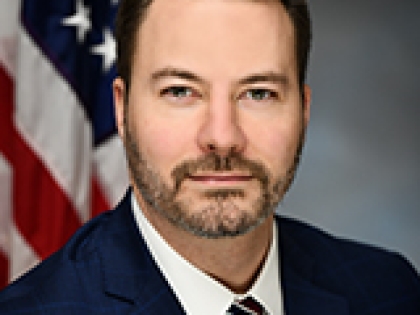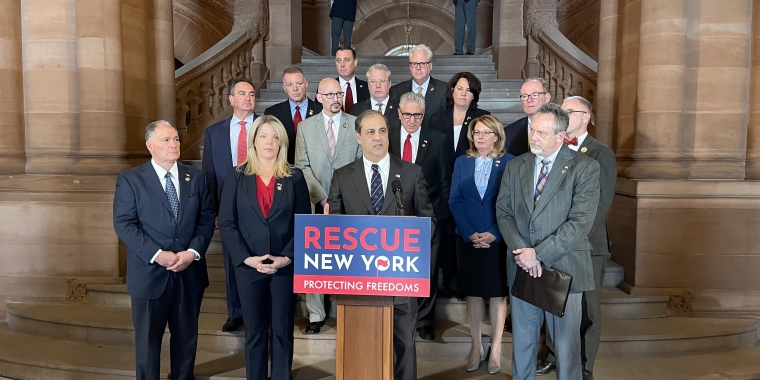
Ortt Unveils His Shake Up the Status Quo Plan Starting With Ethics Laws
May 31, 2016
-
ISSUE:
- Ethics Reform

LOCKPORT –Senator Rob Ortt (R,C,I – North Tonawanda) today unveiled his “Shake up the Status Quo” Plan partly aimed at rooting out corruption and cleaning up the scandal-ridden Capitol. Surrounded by local leaders on the steps of the Niagara County Courthouse, Ortt laid out a total of seven ethics reforms bills he’s in support of that would improve conduct in state government and help restore public trust.
According to a recent Siena College poll, 82 percent of New York voters believe addressing corruption in state government before session ends in June is very important. It also showed that 97 percent of voters said the time for lawmakers to address ethics reforms is now.
Civil Service and Pensions Committee Member Senator Ortt said, “New Yorkers are sick of the scandals in Albany and sick of the business as usual mentality. They’re demanding action and they deserve it, especially after two of our legislative leaders were convicted of public corruption. My Shake up the Status Quo Plan touches on ethics reforms that will put an end to corruption in Albany. We must continue our work to restore the public trust, and ensure that public officials can no longer use their posts for private gain.”
North Tonawanda City Court Judge Hon. Shawn Nickerson said, “Cleaning up Albany and meaningful ethics reform are important issues which concern every New Yorker regardless of political affiliation. I am hopeful that Senator Ortt’s colleagues in Albany will follow his leadership in addressing this very important matter.”
North Tonawanda City Attorney Katie Alexander said, “Providing transparency and accountability to those whom government officials serve is of utmost importance. Those who are elected must serve with integrity, and those that do not should not be able to capitalize on benefits after breaching public trust. I applaud Senator Ortt’s commitment to these bills and encourage his fellow leaders in the Senate and Assembly to join him in providing much needed ethics reform in this state.”
Forfeiture of Pension and Retirement Benefits:
Senator Ortt co-sponsors S1923, which proposes the forfeiture of pension and retirement benefits from any elected official who is convicted of certain felonies involving a breach of public trust. The bill would amend the Constitution preventing elected officials from collecting their pension benefits earned while in office if their felony offense occurred during their time in office.
Under current law, legislators who came into office after August 15, 2011 and are convicted of a felony are automatically be stripped of their pensions. The proposed bill ensures the same goes for all legislators, regardless of how long they have served in office.
This bill is closely related to bill S4611, which was included as a part of the 2015-2016 state budget. The budget bill passed in the Senate at the end of March last year, but was never acted upon in the Assembly. As a result, the budget bill died.
Term Limits:
Senator Ortt is in support of implementing internal safeguards to prevent any politician’s reach from becoming too powerful. He is a co-sponsor of two bills that would set term limits for certain public offices. The first bill (S2722D) limits the tenure of the Temporary President of the State Senate, Speaker of the State Assembly, and Majority and Minority Leaders of the State Legislature to eight years. The term for the Chairman of any single legislative committee is limited to eight consecutive years.
Senate Chamber rules currently prohibit any leader or committee chair from serving more than eight years in that capacity. Those term limits were enacted voluntarily. Legislation to enact it into state law failed in the Assembly earlier this year.
The second bill (S4470) would set term limits for the offices of the governor, comptroller, attorney general and members of the Legislature. A person elected as governor would not be able to hold the seat for more than 2 four-year terms. Currently, the governor has no term limit. The state comptroller and attorney general would also be limited to two terms. And, members of the Senate and Assembly would be limited to serve no more than 6 two-year terms.
Transparency and Accountability across Government:
Senator Ortt is a co-sponsor of three separate bills that would bring transparency and accountability to the Executive Branch. The measures include:
Reforming JCOPE (S7353): An individual who is appointed to the Joint Commission on Public Ethics would be ineligible for the position if he or she has been a New York State registered lobbyist, an elected official, or a state officer or employee, or legislative employee within the last 10 years. Lobbyists, elected officials and commissioners are currently allowed to serve as a member of JCOPE after three years in those roles. Legislative employees, state officers or state employees are currently barred for one year. Additionally, the bill would expand the ban to include all elected officials as opposed to just covering statewide elected officials.
Mandatory Ethics Training (S7355): This bill would require all state officers and state employees in the executive branch, not just the legislative branch, to complete mandatory ethics training once a year. Under current law, legislative members and employees receive annual training, but training topics vary. This bill would also align training requirements across the board, and would be at least two hours long.
Strict Ethics and Oversight for the State’s Regional Economic Development Councils (S7356): Would establish statutes for Regional Economic Development Councils, including Senate consent of council members appointed by the governor. Additionally, the bill would mandate Regional Council members to comply with the financial disclosure filing requirements. And, the bill would mandate that council members be subject to the code of ethics, in the same manner as public officers, legislative employees and members. That section of law states that any member, employee or officer who knowingly violates the code of ethics may be fined, suspended, or removed from office or employment in the manner provided by law.
Governor Cuomo established the Regional Councils in 2011 as part of his initiative to redefine state investment and spur economic development in the 10 regions. This bill does not change the mission of the Regional Councils. The governor would still appoint members to the 10 regions of the state, however, the Senate would be responsible for confirming those members. This bill provides oversight for the governor whose economic development projects have recently come under fire amid an ongoing corruption investigation. The governor currently has the unrestricted ability to unilaterally appoint the individuals responsible for determining the future of the state’s economic development. Those individuals are not currently subject to financial disclosure requirements, which means there is no way to ensure they are serving in the best interest of the state. Subjecting the council members to the code of ethics would also remove any doubt of self-serving activities, and would help to gain public trust by ensuring that their tax dollars are not being misused.
Ortt’s Shake up the Status Quo Plan lays out his top priorities as the 2016 legislative session comes to a close. In the coming weeks, he will hold more events highlighting Second Amendment rights, homeland security, college affordability, and job creation.
Share this Article or Press Release
Newsroom
Go to NewsroomStatement From Senate Republican Leader Rob Ortt
April 17, 2023

Statement From Senate Republican Leader Rob Ortt
April 10, 2023

Statement From Senate Republican Leader Rob Ortt
April 3, 2023

